初中英语句型转换大全(汇编)
初中英语知识点归纳常用句型及句式转换

初中英语知识点归纳常用句型及句式转换英语学习中,句型和句式是非常重要的基础知识。
掌握常用的句型和灵活运用句式可以帮助我们更好地理解英语语法和提高语言表达能力。
下面是初中英语中常见的句型和句式转换的归纳总结。
一、肯定句和否定句的转换1. 肯定句:主语 + 动词 + 其他成分否定句:主语 + 助动词 do/does/did + not + 动词 + 其他成分例句:He is a doctor.(肯定句)He is not a doctor.(否定句)2. 肯定句:主语 + am/is/are + 名词/形容词 + 其他成分/地点/时间否定句:主语 + am/is/are + not + 名词/形容词 + 其他成分/地点/时间例句:They are students.(肯定句)They are not students.(否定句)3. 肯定句:主语 + 动词 + 副词/介词短语 + 其他成分否定句:主语 + 助动词 do/does/did + not + 动词 + 副词/介词短语 + 其他成分例句:She speaks English fluently.(肯定句)She does not speak English fluently.(否定句)二、一般疑问句和特殊疑问句的转换1. 一般疑问句:肯定句:Do/Does/Did + 主语 + 动词 + 其他成分?否定句:Do/Does/Did + 主语 + 动词 + not + 其他成分?特殊疑问句:疑问词 + 一般疑问句的语序例句:She goes to school by bus.(一般疑问句)Does she go to school by bus?(特殊疑问句)2. 一般疑问句:肯定句:Am/Is/Are + 主语 + 名词/形容词 + 其他成分/地点/时间?否定句:Am/Is/Are + 主语 + not + 名词/形容词 + 其他成分/地点/时间?特殊疑问句:疑问词 + 一般疑问句的语序例句:They are students.(一般疑问句)Are they students?(特殊疑问句)3. 一般疑问句:肯定句:助动词 + 主语 + 动词 + 副词/介词短语 + 其他成分?否定句:助动词 + Do/Does/Did + 主语 + 动词 + not + 副词/介词短语 + 其他成分?特殊疑问句:疑问词 + 一般疑问句的语序例句:He speaks English fluently.(一般疑问句)Does he speak English fluently?(特殊疑问句)三、陈述句和祈使句的转换1. 陈述句:主语 + 动词 + 其他成分祈使句:动词 + 其他成分(一般省略主语 you)例句:They play football.(陈述句)Play football.(祈使句)2. 陈述句:主语 + am/is/are + 名词/形容词 + 其他成分/地点/时间祈使句:Be + 名词/形容词 + 其他成分/地点/时间例句:You are a student.(陈述句)Be a student.(祈使句)3. 陈述句:主语 + 动词 + 副词/介词短语 + 其他成分祈使句:动词 + 副词/介词短语 + 其他成分例句:She speaks English fluently.(陈述句)Speak English fluently.(祈使句)通过以上的归纳总结,我们可以更好地理解和运用常用的句型和句式转换。
(完整版)初中英语句型转换练习及答案

(完整版)初中英语句型转换练习及答案一、句型专项练习(后附答案)1.I know the answer.(一般疑问句) know the answer?2.We can see some birds.(一般疑问句) see birds?3.There is a computer in my house.(一般疑问句)a computer in house?4.There are some flowers on the teachers'desk.(一般疑问句)flowers on the teachers'desk?5.There are some apples on the tree.(否定式)There apples on the tree.6.I think he is very old.(否定句) I think he very old.7.Please colour it green.(否定句) colour it green.8.We can speak good English.(变否定句) We speak good English.9.Thank you for helping me.(同义句) Thank you for .10.There aren't any pears in thebox.(同义句)There are pears in the box.11.Whose are these clothes?(同义句) are these?12.Let me look at your book.(同义句)Let me your book.13.Her sweater is red.(对划线部分提问) is her sweater?14.My pencils are in the pencil-box.(对划线部分提问)your pencils?15.I get up at six every day.(对划线部分提问)do you get up every day?16.There are fifty students in my class.(对划线部分提问)students are there in your class?17.These are cars.(用buses 改写成选择疑问句)Are these cars ?18.The book is in my schoolbag.(变否定疑问句)the book in your school-bag?19.Two boys are in our house.(改为 there be 句型) two boys in our house.20.Can't you find the map?(作肯定回答) ,I .初中英语核心句型百例配套练习及答案一.Fill the following blanks with the proper words.1.Welcome China.2.What's the matter your watch?3.The weather in Beijing is different that of Nanjing.4.His trousers are the same mine.5.Mr. Wang is very friendly us.6.My father made a kite me.7.What do you mean doing that?8.I'd like you to stay me tonight.9.His school is far his home.10.The hospital is near the post office.11.We all do well swimming.12.They are good boating.13.I spent twenty years writing the novel.14.Jim spent 1000 yuan the bike.15.Jim paid 1000 yuan the bike.16.The started the meeting a song.17.Thank you helping me.18.What do you learn English ?19.I sometimes help my mother the housework.20.That has nothing to do me.21.It is lucky you to go to London.22.beautiful the flower is!23.an beautiful flower it is!24.bad weather it is today!25.I find it hard me to speak English well!26.They often ask me money.27.Please show the map me.28.Pass the cup of tea me.29.Mother me a bike yesterday.30.Mother bought a bike me.31.Jim gave an English dictionary me.32.I got Beijing the morning of May 1st.33.I arrived Beijing the morning of May 1st.34.I Beijing on the morning of May 1st.35.There is something wrong my car.36.Something is wrong my car.37.How do you38.What do you think Beijing?Beijing?39.What do you want to buy?40.Where have you gone?41.I have nothing to tell you.42.He went on his work after a short rest.43.I came to say good-bye you.44.They are busy their work now.45.English is very interesting. We are all interested it.46.Mother told me to go shopping her.47.I will call you tomorrow.48.We are ready the final examination.49.Let's do shopping first.50.Lucy prefers English French.51.I staying at home going to the cinema.52.Mr. Wang will us to the park next Sunday.53.Please the map to me.54.It's very nice ?? you to help me my math.55.My father me a kite. = My father made a kite me.二.Fill in the blanks with the proper form of the given words.1.I want (go) to school.2.I want my son (have) a talk with me.3.We don't know what (do) next.4.Let him (enter) the room.5.Let him not (stand) in the rain.6.Why don't you (play) football with us?7.Why not (play) football with us?8.What do you mean doing that?9.Jim likes (swim). But He doesn't like (swim) now.10.I feel like (eat) bananas.11.Would you like (go) (row) with me?12.I'd like you (stay) with me tonight.13.His brother often makes him (stay) in the sun.14.Let me (sing) a song for you.15.You shouldn't (have) the students (work) so hard.16.They are good at (boat).17.It took me more than a year (learn) to draw a beautiful horse in five minutes.18.I spent twenty years in (write) the novel.19.We are going (study) in Japan.20.Thank you for (help) me.21.How about (go) fishing?22.Lucy is the (tall) in her class.23.Lucy is (tall) than any other student in her class.24.I have25.You'd better (go) home now.(study) hard at English.26.You'd better not (stay) up.27.Lucy often helps Lily (wash) her clothes.28.Let's (make) it 8:30.29.That has nothing (do) with me.30.I don't think it (rain) tomorrow.31.It is lucky for you (go) to London.32.I find it hard (speak) English well!33.You need (study) hard, don't you?34.I (not need) your money.35.We use pens (write).36.I hope (see) you soon.37.I started (learn) English in 1983.38.I started to watch TV after (finish) my homework.39.I finished (clean) my car just now.40.They all enjoy (live) and (work) in China.41.What else do you want (buy)?42.Where else you (be) recently?43.I forgot (turn) off the lights. Look, it is dark in the room.44.I forgot (turn) off the lights. Could you go back and shut the off?45.I remembered (return) your money. Why do ask for it again?46.Remember (bring) me some money. I've run out of it.47.He stopped (talk) with Mary when she met her in the street.48.The students stopped (talk) when the teacher came in.49.I saw you (pick) an apple just now.50.I (see) you (play) basketball with your classmates on the playground last Sunday.51.He went on (read) after a short rest.52.He went on (read) after (finish) wash the dishes.53.They are busy (plant) trees on the hill.54.English is very interesting. We are all interested in (learn) it.55.Mother told me (go) (shop) with her.56.Jim ask me (go)rowing with him.57.Let's (go) (fish).58.I prefer (stay) at home to (go) to the cinema.59.It's very nice of you (help) me with my English.60.Both Tom and I (be) good at English.61.Neither Tom and I (be) interested in PE.62.Either Tom and I (be) satisfied with our examinations.63.Not only you but also I (be) late for the meeting yesterday.64.There (be) an honest man and two clever women in the country.65.More than one student (water) the flowers in the school garden at this time yesterday.66.Everyone in our class (like) English.67.Tom usually (get) up at 6 o'clock. But this morning he (get) up a little (late) than usual, at about 7 o'clock.. Tomorrow morning he (get) up a little (early) than usual, at around 5 o'clock.68.(come) to school on time from now on. (not be) late again.句型专项练习答案:1.Do you2.Can you,any3.Is there,your4.Are there any5.are not any6.don't,is7.Please don't8.can not9.your help 10.no 11.Whose clothes 12.have a look at 13.What colour 14.Where are 15.What time16.How many 17.or buses 18.Isn't 19.There are 20.Yes,can初中英语核心句型百例配套练习答案:一.Fill the following blanks with the proper words.1. to2. with3. from4. as5. to6. for7. by8. with9. from 10. to 11. in 12. at 13. in 14. on 15. for 16. with 17. for 18. for 19. with 20. with 21. for 22. Wow 23. What 24. What 25. for 26. for 27. to 28. to 29. bought 30. for 31. to32. to … on 33. in … on 34. reached 35. with 36. with 37. like 38. of 39. else 40. else 41. else 42. doing 43. to 44. doing 45. in 46. with 47. up 48. for 49. some 50. to 51. prefer … to 52. Take 53. bring 54. of … with 55. made … for二.Fill in the blanks with the proper form of the given words.1. to go2. to have3. to do4. enter5. stand6. play7. play8. by9. swimming … to swim 10. eating 11. to go ... rowing 12. to stay 13.stay 14. sing 15. have … work 16. boating 17. to learn 18. writing 19. to study 20. helping 21. going 22. tallest 23. taller 24. to go 25. study 26. stay27. to wash\wash 28. make 29. to do 30. will rain 31. to go to speak 32. to study 33. don't need 34. to write 35. to see 36. to learn 37. finishing 38. cleaning 39. living] 40. living … working 41. to buy 42. have … been 43. turning 44. to turn 45. returning 46. to bring 47. to talk 48. talking 49. pick 50. saw … playing51. reading 52. to … finished 53. planting 54. learning 55. to go … shopping 56. to go 57. go … fishing58. staying … going 59. to help 60. are 61. am 62. am 63. am 64. is 65. was watering 66. likes67. gets… got … later … will get… earlier 68. Come … Don't be。
七年级英语句型转换1-100附答案
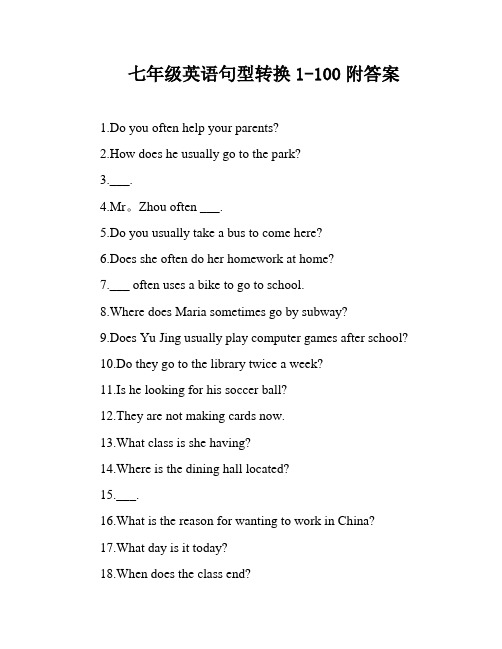
七年级英语句型转换1-100附答案1.Do you often help your parents?2.How does he usually go to the park?3.___.4.Mr。
Zhou often ___.5.Do you usually take a bus to come here?6.Does she often do her homework at home?7.___ often uses a bike to go to school.8.Where does Maria sometimes go by subway?9.Does Yu Jing usually play computer games after school?10.Do they go to the library twice a week?11.Is he looking for his soccer ball?12.They are not making cards now.13.What class is she having?14.Where is the dining hall located?15.___.16.What is the reason for wanting to work in China?17.What day is it today?18.When does the class end?19.What subject are you currently studying?20.How many lessons do they have every day?21.There is no picture on the wall.22.What is she making?23.There are boys in the room.24.Does Tom have books?25.___.26.How many days are there in a week?27.Where are your shoes located?28.Are there any books and a pen on my desk?29.Would you like to go to school by bus?30.What is on the table near the window?31.What is in the living room?32.There are no computers in our school.33.Is your study on the first floor or the second floor?34.Where are your books?___.36.There are some old men in the room.37.There is no meat on the plate.38.Is there a map of Beijing on the wall。
初一英语语法--句型转换(详细内容)
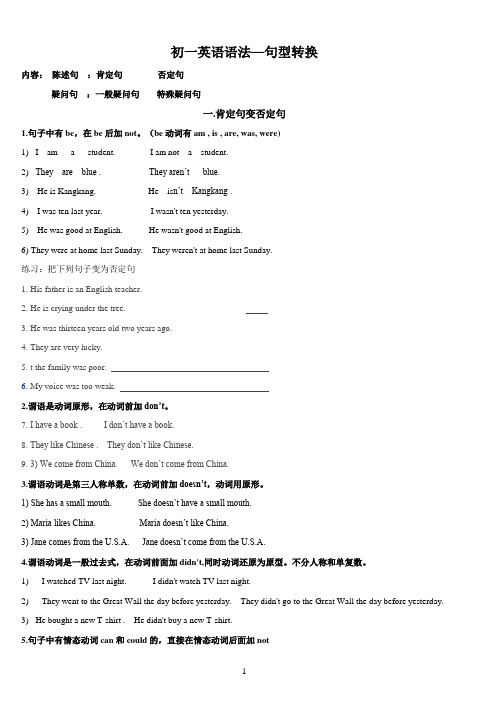
初一英语语法—句型转换内容:陈述句:肯定句否定句疑问句:一般疑问句特殊疑问句一.肯定句变否定句1.句子中有be,在be后加not。
(be动词有am , is , are, was, were)1)I am a student. I am not a student.2)They are blue . They aren’t blue.3) He is Kangkang. He is n’t Kangkang .4) I was ten last year. I wasn't ten yesterday.5) He was good at English. He wasn't good at English.6) They were at home last Sunday. They weren't at home last Sunday.练习:把下列句子变为否定句1.His father is an English teacher._____________________________2.He is crying under the tree. ___________________________ __3.He was thirteen years old two years ago._______________________4.They are very lucky.______________________________________5.t the family was poor.6.My voice was too weak.2.谓语是动词原形,在动词前加don’t。
7.I have a book . I don’t have a book.8.They like Chinese . They don’t like Chinese.9.3) We come from China. We don’t come from China.3.谓语动词是第三人称单数,在动词前加doesn’t,动词用原形。
七年级英语句式转换30道

七年级英语句式转换30道1. 陈述句:She is a student. 疑问句:Is she a student? 解析:陈述句中有be 动词is,变为一般疑问句时将is 提到句首,句末用问号。
2. 陈述句:They are in the classroom. 疑问句:Are they in the classroom? 解析:陈述句中有be 动词are,变为一般疑问句时将are 提到句首。
3. 陈述句:I am happy. 疑问句:Am I happy? 解析:陈述句中有be 动词am,变为一般疑问句时将am 提到句首,注意第一人称I 变为第二人称you 时,be 动词要用are。
4. 陈述句:He likes apples. 疑问句:Does he like apples? 解析:陈述句中动词likes 是第三人称单数形式,变为一般疑问句时要借助助动词does,likes 变回原形like。
5. 陈述句:We play football on Sundays. 疑问句:Do we play football on Sundays? 解析:陈述句中动词play 是原形,变为一般疑问句时借助助动词do。
6. 陈述句:The dog runs fast. 疑问句:Does the dog run fast? 解析:陈述句中动词runs 是第三人称单数形式,变为一般疑问句时借助助动词does,runs 变回原形run。
7. 陈述句:My father works hard. 疑问句:Does my father work hard? 解析:陈述句中动词works 是第三人称单数形式,变为一般疑问句时借助助动词does,works 变回原形work。
8. 陈述句:She has a pen. 疑问句:Does she have a pen? 解析:陈述句中has 是have 的第三人称单数形式,变为一般疑问句时借助助动词does,has 变回原形have。
英语句型转换汇编

英语句型转换一、将下列句子改为否定句。
1、He takes some pictures every day.他每天拍一些照片He doesn't take photos every day。
他每天都不拍照片2、It’s cheap enough.够便宜的了It's not cheap这一点不便宜的3、She gave her brother some tapes about folk music.她给她哥哥对民间音乐磁带She didn't give her brother a tape of folk music.她没给她哥哥民间音乐磁带4.This is the first time we come to Australia. 这是我们第一次来澳大利亚This is not the first time we come to Australia.这不是我们第一次来澳大利亚5、There are a lot of lovely animals there.那儿有许多可爱的动物There are no lovely animals there。
那儿没有可爱的动物。
6、My mother will take me to Beijing for my holiday next Sunday.我妈妈要带我去北京,下星期日我的假期My mother doesn't take me to Beijing. I won't have a holiday next Sunday。
我妈妈不带我去北京,下星期日我没有假期。
7、You can find many tall trees in the picture of the park.你可以在公园的照片发现有许多高大的树木. You don't find many tall trees in the Park Photos你在公园的照片没有发现有许多高大的树木8、I am listening to music.我在听音乐I didn't listen to music。
初中英语七年级必备整理版句型转换(陈述句变一般疑问句特殊疑问句及练习)

学习必备欢迎下载初中英语句型转换一、 肯定句改的方法——一步法1. 有 be 动词(is are am were was)/情态动词(can,could, will, would, shall, should,must,may)的。
在 be 动词/情态动词后后加 not。
2. 无 be 动词/情态动词,一般现在时在动词前加 don’t 第三人称单数前 doesn't/一般过去式 didn’t。
3 加 doesn't/ did n’t 的句子注意,句子动词要变成原型。
二、 肯定句改一般疑问句的方法——三步法1. 有 be 动词/情态动词:be 动词/情态动词提到句首,其余照抄,(some 改成 any,第一人称变为第二人称 my改成 your , I 改成 you,we 改成 you,our 改成 your )句末用问号。
2. 无 be 动词/情态动词,在句首加 Do/Does/Did,其余照抄,(some 改成 any,第一人称变为第二人称 my 改成 your , I 改成 you,we 改成 you,our 改成 your )句末用问号。
3. 加 Does、did 的句子注意,句子动词要变成原型。
例如 陈述句: They are in the park.He can play the guitar.He likes the dogs.否定句 They are not in the park. He can not play the guitar. He doesn't like the dogs一般疑问句: Are they in the park?Can he play the guitar?Does he like the dogs?把下列句子变成一般疑问句和 否定句1. I am listening to music._______________________________________2 Tom likes listening to music________________________________________3. Sarah can clean the classroom.________________________________________4. I put a book on my head.________________________________________5. There were some flowers in the vase. 6. We play basketball on Sundays. 7 I go to see my parents once a month.________________________________________ __________________________________________________________________8. She needs some masks._________________________________9. They like making the puppet.______________________10.SuHai and Su Yang lived in a new house. ________________________ ____________________特殊疑问词的用法who whom what意思 谁谁什么用法 问人的身份,姓 名等 问人的身份,姓 名等(问宾语) 问人的职业或 事物是什么例句He is LiLieWho is he ?He is my brother. Who is he ?I can ask him the question.Whom can you ask the question?He is a worker. What is he?He has a book. What does he have ?学习必备欢迎下载which哪一个 问 一 定 范 围 内 The big box is mine. Which box is yours?特指的人或物 The girl at the door is Ann. Which girl isAnn?whose谁的问所属关系This is her book. Whose book is this ?This book is hers. Whose is this book?what什么颜色 问颜色(表语) My skirt is red. What color is your skirt?colorWhat几点问点时间We play games at five in the afternoon ?timeWhat time do you play games?when什么时候 问时间We play games in the afternoon ?When do you play games?where什么地方 问地点(状语) We play games at home on Sunday ?Where do you play games on Sunday?why为什么 问原因He isn't at school today because he is ill.Why isn't he at school today ?how怎样问健康状况、 He is fine/strong. How is he ?做事的方式等 I go home by bike. How do you gohome?how old 多大几岁 问年龄He is ten. How old is he ?how多少跟复数名词, There are thirty boys in my class.many问数量How many boys are there in your class?how多少跟不可数名词 There is some milk in the bottle.much问数量或价钱 How much milk is there in the bottle?how far 多远问路程It's five kilometers away from here?How far is it from here?how soon 多久问 in+一段时间 He can finish it in half an hour.How soon can he finish it ?how long 多久问一段时间, He has lived here for a year.问物体的长短 How long has he lived here?The desk is one meters long.How long is the desk ?how often 多久问频率I go to see my parents once a month.(一次)How often do you go to see your parents?How 的疑问句辨析一、how many 和 how much 的区别how many 用来询问可数名词的数量,它的句式是:How many+复数名词+一般疑问句+?how much 用来询问不可数名词的数量,也可询问价格。
初一英语句型转换大全

初一英语句型转换大全Title: Junior High English Sentence Transformation Guide.Introduction.Sentence transformation in English is an essentialskill that helps students enhance their language proficiency and creativity. It involves converting a given sentence into another form without changing its original meaning. This guide covers various sentence transformation techniques suitable for junior high students, providing examples and explanations to aid understanding.1. Active Voice to Passive Voice.Active Voice: John wrote a book.Passive Voice: A book was written by John.Explanation: In the active voice, the subject performs the action, while in the passive voice, the action is performed on the subject.2. Simple Sentence to Compound Sentence.Simple Sentence: She is smart. She studies hard.Compound Sentence: She is smart and studies hard.Explanation: A simple sentence has one subject and one predicate. A compound sentence combines two or more simple sentences using coordinating conjunctions.3. Direct Speech to Indirect Speech.Direct Speech: "I am coming," he said.Indirect Speech: He said that he was coming.Explanation: Direct speech is when someone speaks directly to the listener, while indirect speech reportswhat someone said without using quotation marks.4. Affirmative Sentence to Negative Sentence.Affirmative Sentence: She is a doctor.Negative Sentence: She is not a doctor.Explanation: An affirmative sentence asserts a fact, while a negative sentence denies it.5. Declarative Sentence to Interrogative Sentence.Declarative Sentence: He is a teacher.Interrogative Sentence: Is he a teacher?Explanation: A declarative sentence makes a statement, while an interrogative sentence asks a question.6. Transformation of Simple Present Tense to Simple Past Tense.Simple Present Tense: She watches TV every day.Simple Past Tense: She watched TV every day.Explanation: The simple present tense is used for actions that occur regularly or habits, while the simple past tense is used for actions that occurred in the past.7. Transformation of Simple Future Tense to Future Perfect Tense.Simple Future Tense: I will visit my grandparents next week.Future Perfect Tense: I will have visited my grandparents by next week.Explanation: The simple future tense expresses actions in the future, while the future perfect tense expresses actions that will be completed in the future.8. Transformation of Simple Present Tense to Present Continuous Tense.Simple Present Tense: She studies hard.Present Continuous Tense: She is studying hard.Explanation: The simple present tense is used for general truths or habits, while the present continuous tense is used for actions that are currently happening.Conclusion.Sentence transformation is a crucial skill in English language learning. Junior high students can enhance their language proficiency by practicing and applying these transformation techniques. With regular practice, they will be able to create more varied and interesting sentences, improving their communication skills.。
中考重点句型转换与句子改错
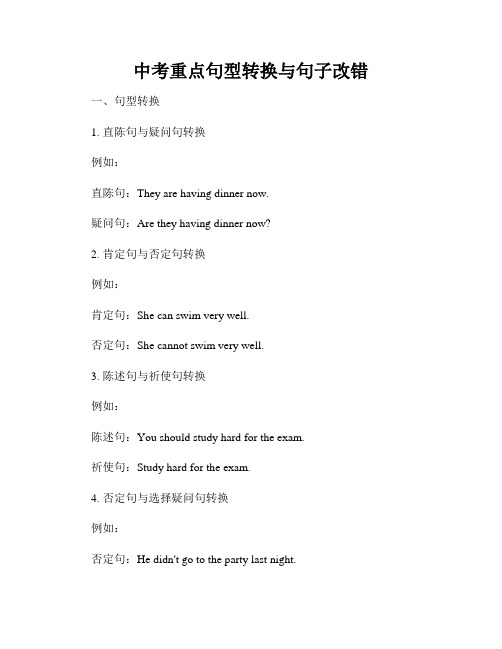
中考重点句型转换与句子改错一、句型转换1. 直陈句与疑问句转换例如:直陈句:They are having dinner now.疑问句:Are they having dinner now?2. 肯定句与否定句转换例如:肯定句:She can swim very well.否定句:She cannot swim very well.3. 陈述句与祈使句转换例如:陈述句:You should study hard for the exam.祈使句:Study hard for the exam.4. 否定句与选择疑问句转换例如:否定句:He didn't go to the party last night.选择疑问句:Did he go to the party last night?5. 特殊疑问句转换为陈述句例如:特殊疑问句:What is your favorite color?陈述句:My favorite color is blue.二、句子改错(以下为例句,具体句子改错内容可自行拓展)1. We will go to the park after we finished our homework.改正:We will go to the park after we finish our homework.2. The girl is very kind and always help others.改正:The girl is very kind and always helps others.3. What interesting news did you hear from your friend?改正:What interesting news did you hear from your friends?4. He told me that don't forget to bring my umbrella.改正:He told me not to forget to bring my umbrella.5. Are you going to visit your grandparents or go shopping this weekend?改正:Are you going to visit your grandparents or are you going shopping this weekend?6. The weather is very nice, so we decided to take a walk and went to the park.改正:The weather is very nice, so we decided to take a walk and go to the park.7. Can you let me know where is the nearest bus stop?改正:Can you let me know where the nearest bus stop is?8. My brother said if he has enough time, he will go to the party with us.改正:My brother said if he has enough time, he would go to the party with us.三、总结以上是中考重点句型转换与句子改错的内容。
25个英语中考常考句型转换知识点
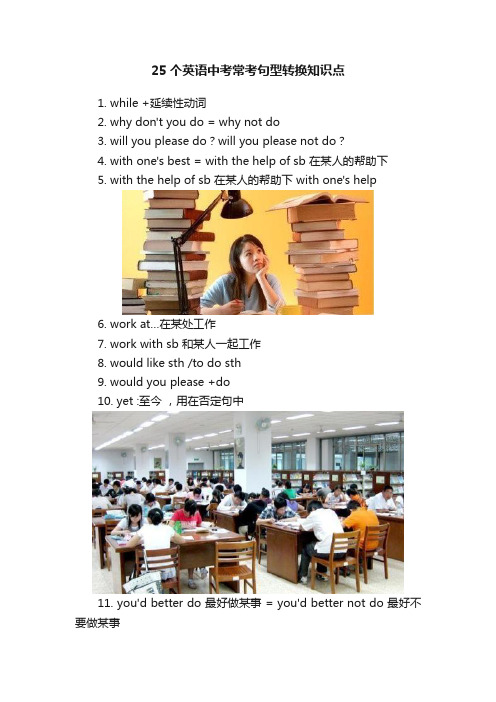
25个英语中考常考句型转换知识点1. while +延续性动词2. why don't you do = why not do3. will you please do?will you please not do?4. with one's best = with the help of sb 在某人的帮助下5. with the help of sb 在某人的帮助下 with one's help6. work at…在某处工作7. work with sb 和某人一起工作8. would like sth /to do sth9. would you please +do10. yet :至今,用在否定句中11. you'd better do 最好做某事 = you'd better not do 最好不要做某事12. 系动词(taste吃起来/sound听起来/look看起来/semll闻起来)+adj13. 名词、副词、形容词修饰 enongh 时, 形容词放在之前,名词副词放在之后14. 太多 too much +不可数 too many +可数 much too 相当于very ,修饰形容词15. 向宾语提问:Whom16. 向地点提问:Where17. 向方式提问:How18. 向价格和不可数名词提问:How much19. 向可数名词提问:How many20. 向频率提问: How often21. 向时间段提问:How long22. 向时间提问:what time/when23. 向物主代词提问:Whose24. 向职业提问:what do/does……do25. 向主语提问: Who。
中考英语同义句句型转换大全
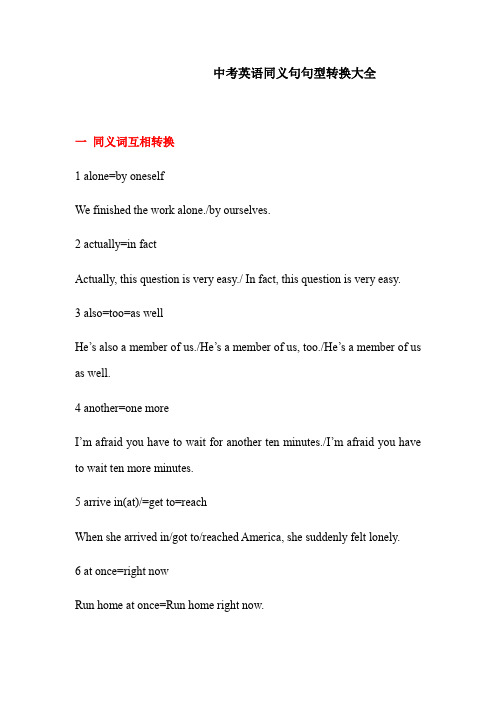
中考英语同义句句型转换大全一同义词互相转换1 alone=by oneselfWe finished the work alone./by ourselves.2 actually=in factActually, this question is very easy./ In fact, this question is very easy.3 also=too=as wellHe’s also a member of us./He’s a member of us, too./He’s a member of us as well.4 another=one moreI’m afraid you have to wait for another ten minutes./I’m afraid you have to wait ten more minutes.5 arrive in(at)/=get to=reachWhen she arrived in/got to/reached America, she suddenly felt lonely.6 at once=right nowRun home at once=Run home right now.7 continue/go onLet’s continue/go on reading the passage.8 cost=spend=take=pay(1)I spent ten yuan of/(in) buying this book../This book cost me tenyuan./I paid ten yuan for this book.(2)It took us three days to fulfill this task./We spent three days on thistask/in fulfilling this task.9 cross=go acrossBefore crossing/going across the road, please look both sides.10 sometimes/=t timesHe is a good man, but he can be really bad-tempered sometimes./at times.11 die/=ose one’s lifeThose people died/lost their lives during the earthquake.12 now/at the momentShe is talking about the problem with her classmates now./at the moment 13 else=otherWhat else/other things can you see in the picture?14 then=t that moment/at that timeShe was shopping then/at that moment/at that time, so she knew nothing about it.15 like/love/enjoy/be fond of/be interested in/care forShe likes/enjoys/loves/is fond of/is interested in/cares for collecting stamps very much.16 will/be going to/be about toThe teachers will/are going to/are about to have a meeting tomorrow afternoon.17 want/would likeDo you want to go abroad to study further?/Would you like to go abroad to study further/18 can/be able to/have the ability to doCan you tell me the way to the library?/Are you able to tell me the way to the library?/Do you have the ability to tell me the way to the library?19 visit/call onLin Tao visited/called on his grandparents last week.20 favorite/like bestWhat’s your favorite sport?/What sport do you like best?21 happen/take placeWhat happened?/What took place?22 decide/make a decision/make up one’s mindShe can’t decide/make a decision/make up her mind where to go.23 found/establish/set upThe students founded/established/set up a group to protect the environment.24 finally/at last/in the endFinally/At last/In the end, she won the race.25 leave/be awayHe left yesterday./He has been away for a day.26 return/give backHe hasn’t returned the book to me./He hasn’t given the book back to me. return/go backHe will go back/return in a month.27 why/what for/how come-She cried so badly. –How come?What did she cry so sadly for?/Why did she cry so badly?28 over/more thanOver/More than a hundred people tried this new kind of food.29 whatever/no matter whatWhatever/No matter what you find in the box, they belong to Amy.30 whenever/no matter whenWhenever/No matter when you come to see me, I will treat you as my relative.31 walk/ go…on footDo you walk to school every day?/Do you go to school on foot every day?32 should/ought to/be supposed toWe should/ought to/are supposed to use both sides of the paper to reduce wastes.33 population/peopleWhat is the population of China?/How many people are there in China?34 quit/stop/drop/give upMy father quitted/stopped/dropped/gave up smoking.35 maybe/perhaps/may beMaybe/Perhaps it is not my pen./ The pen may not be mine.二同义词组互相转换1 a lot of/lots ofA lot of/Lots of artists will show their faces at the party.2 all over the world/around the worldEnglish is spoken widely all over the world./around the world3 not as(so)…as/less thanThis book is not as(so) interesting as that one./That book is more interesting than this one.4 as…as possible/as…as sb canRun home as fast as possible/as fast as you can to tell your mother the good news.5 at risk/in danger/in troubleThe pandas in our country are at risk./in trouble/in danger6 at the age of…/when sb.+be+…years oldHis parents died when he was six years old./His parents died at the age of six.7 because of/due to/as a result of/with one’s help/thanks toBecause of?/Due to/As a result of his help, he passed this exam.With his help/With the help of him, he passed the exam./Thanks to his help, he passed the exam.8 be careful/look out/take careLook out!/Be careful/Take care! The flood is coming.9 be worried about/worry aboutLiu Ming is worried about his following oral test./Liu Ming can’t stop his following oral test.10 both…and…/not only…but also…He is not only a singer but also a doctor./He is both a singer and a doctor.11 be good at/do well inHe is good at drawing./He does well in drawing.12 be proud of/take pride inWe are all proud of our country’s astronaut./He takes pride in ourcountry’s astronaut.13 come up with/think of/have an ideaTome came up an idea./Tom thought of an idea./Tom had an idea.14 ride a bike/go…by bikeHe often rides a bike to work./He often goes to work by bike.15 come from/be fromWhere do you come from?/Where are you from?16 have a good time/enjoy oneself//play happilyWe had a good time/enjoyed ourselves/played happily on Christmas Day.17 have a pain in head/have a headacheHe didn’t go to school today, because he had a pain in head./had a headache18 hear from/receive(get) a letter fromShe is very happy to hear from/receive a letter from a Canadian friend. 19 had better do/It’s best to doYou had better read in the sun./It’s best for you to read in the sun.20 how about/what aboutHow about/What about going skating?21 in order to/in order that/to do/so thatHe worked day and night to be a successful man./He worked day and night in order to be a successful man./He worked day and night in order that he could be a successful man./He worked day and night so that he could be a successful man.22 keep off/keep away fromKeep off /Keep away from the grass!23 in/wearShe is in/wears a white dress today.24 keep sb. from doing/stop sb. (from) doing/prevent sb. (from) doing Trees can stop the soil flowing away./ Trees can prevent the soil flowing away./Trees can keep the soil from flowing away.25 learn …by oneself/ teach oneselfNobody taught him. He learnt it by himself./He taught himself.26 like …better than/prefer…to…/prefer to do…rather than do …John likes swimming better than skating./John prefers swimming to skating./John prefer to swim rather than skate.27 long, long ago/once upon a timeLong, long ago/Once upon a time, there was a beautiful princess living in an old castle.28 look after well/take good care ofThanks for looking after my cat /taking good care of my cat well while I was away.29 no longer/not …any longerShe is no longer a little girl./She is not a little girl any longer.30 shall we/Let’s..Shall we watch the film together?/Let’s watch the film together.31 take part in/join in/participate inHe took part in /joined in/participated in the match.32 too…to/so…that…/enough to…He is too busy to visit us./He is so busy that he can’t visit us./He is not free enough to visit us.三同义句型互相转换1运用两种时态(一般过去时和现在完成时互相转换)(1)He left last year.(2)He has been away for one year.(3)He has been away since a year ago.(4)It is a year since he left.(5)One year has passed since he left.2最高级和比较级的互相转换(1)He is the tallest student in his class.(2)He is taller than any other student in his class.(3)He is taller than the other students in his class.(4)No one else is taller than him in his class.3运用两种语态(主动语态和被动语态互相转换)I clean my room every day./My room is cleaned every day. 4感叹句的两种句型之间互相转换What a careful girl she is!/How careful the girl is!5运用关联词语合并句子(1)Amy can’t dance. Susan can’t, either.Neither Amy nor Susan can dance.(2)I has eaten breakfast and my mother has eaten it, too.Both my mother and I have eaten breakfast.6运用复合句和不定式互相转换(1)I hope that I can visit the moon one day./I hope to visit the moon oneday.(2)He told me how he could use a computer./He told me how to use acomputer.7运用不同的句式结构互相转换(1)She wants to go shopping and her friends want to go shopping,too./She wants to go shopping, and so do her friends.(2)He went to bed after he finished his homework./He went to bed afterfinishing his homework./He didn’t go to bed until he finished his homework.(3)Come on, or we’ll miss the early bus./If we don’t hurry, we’ll miss theearly bus.(4)The man gave us a talk last week, and he will give us another talk thisweek./The man who gave us a talk last week will give us another talk this week.8用it做形式主语互相转换(1)He can finish the work easily./It is easy for him to finish the work.(2)We found it hard to shake./We found it was hard to skate.。
中考英语句型转换(全)
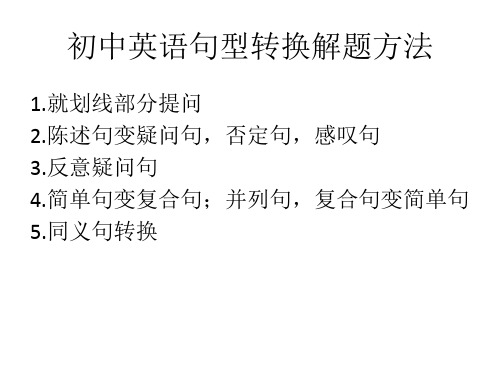
What are the children doing on the hill? 3. She has four lessons in the morning. 具体步骤:(一)画线部分是数量词作定语,疑问 词用how many,而且lessons应紧跟其后;
(二)判定疑问词后接一般疑问句语序,因是一般 现在时,且主语为单数,故主语前加助动词does, 将谓语动词has还原成have; (三)抄写剩余部分,并注意大小写和标点符号 How many lessons does she have in the morning?
(二)对其他成分提问,做法是:疑问词放在句首, 然后再把原句改为一般疑问句。如: 1. 对宾语提问: Tom is going to buy some books. →What is Tom going to buy? 2. 对表语提问: These are books. →What are these? 3.. 对宾语部分中的定语以及 “there be”句型中的主 语的定语提问时,应把被修饰的名词连同疑问词 一起放在句首。如: ①They have six classes on Monday.(对宾语部分中 的定语提问) →How many classes do they have on Monday?
对划线部分提问练习 His father is an engineer.(对划线部分提问) ______ his father’s ___ ____? Mr King is from America.(对划线部分提问) ______ is Mr King _____ ___? Jenny is English.(对划线部分提问) What’s ________ ______ ___? I have three cousins.(对划线部分提问) __________________________? These are Jenny’s CDs.(对划线部分提问) _____________________________?
初中阶段一些常见、有用的句型转换
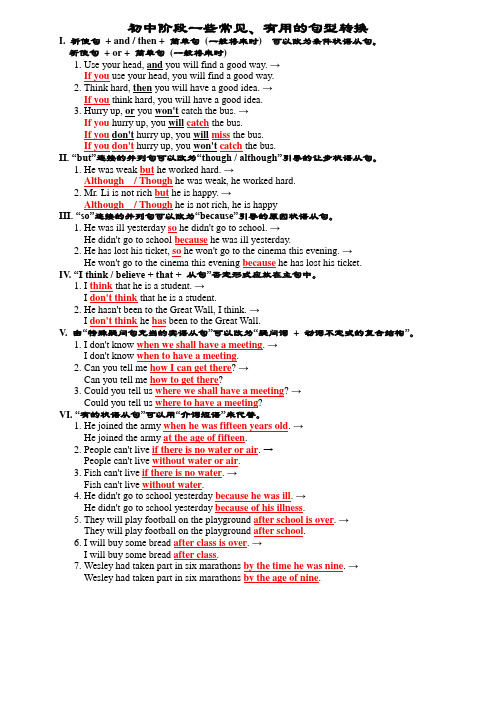
初中阶段一些常见、有用的句型转换I. 祈使句+ and / then + 简单句(一般将来时) 可以改为条件状语从句。
祈使句+ or + 简单句(一般将来时)e your head, and you will find a good way. →If you use your head, you will find a good way.2.Think hard, then you will have a good idea.→If you think hard, you will have a good idea.3.Hurry up, or you won't catch the bus.→If you hurry up, you will catch the bus.If you don't hurry up, you will miss the bus.If you don't hurry up, you won't catch the bus.II. “but”连接的并列句可以改为“though / although”引导的让步状语从句。
1. He was weak but he worked hard.→Although / Though he was weak, he worked hard.2. Mr. Li is not rich but he is happy.→Although / Though he is not rich, he is happyIII. “so”连接的并列句可以改为“because”引导的原因状语从句。
1. He was ill yesterday so he didn't go to school.→He didn't go to school because he was ill yesterday.2. He has lost his ticket, so he won't go to the cinema this evening.→He won't go to the cinema this evening because he has lost his ticket.IV. “I think / believe + that + 从句”否定形式应放在主句中。
八年级英语句型转换20题
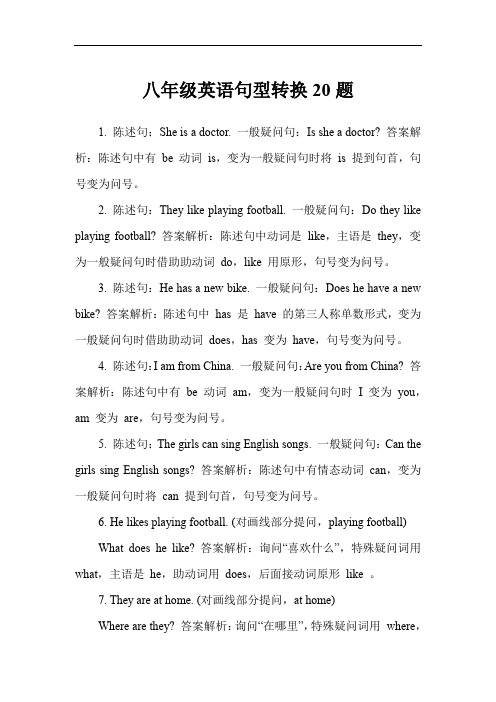
八年级英语句型转换20题1. 陈述句:She is a doctor. 一般疑问句:Is she a doctor? 答案解析:陈述句中有be 动词is,变为一般疑问句时将is 提到句首,句号变为问号。
2. 陈述句:They like playing football. 一般疑问句:Do they like playing football? 答案解析:陈述句中动词是like,主语是they,变为一般疑问句时借助助动词do,like 用原形,句号变为问号。
3. 陈述句:He has a new bike. 一般疑问句:Does he have a new bike? 答案解析:陈述句中has 是have 的第三人称单数形式,变为一般疑问句时借助助动词does,has 变为have,句号变为问号。
4. 陈述句:I am from China. 一般疑问句:Are you from China? 答案解析:陈述句中有be 动词am,变为一般疑问句时I 变为you,am 变为are,句号变为问号。
5. 陈述句:The girls can sing English songs. 一般疑问句:Can the girls sing English songs? 答案解析:陈述句中有情态动词can,变为一般疑问句时将can 提到句首,句号变为问号。
6. He likes playing football. (对画线部分提问,playing football)What does he like? 答案解析:询问“喜欢什么”,特殊疑问词用what,主语是he,助动词用does,后面接动词原形like 。
7. They are at home. (对画线部分提问,at home)Where are they? 答案解析:询问“在哪里”,特殊疑问词用where,主语是they,be 动词用are 。
8. She goes to school by bike. (对画线部分提问,by bike)How does she go to school? 答案解析:询问“出行方式”,特殊疑问词用how,主语是she,助动词用does,后面接动词原形go 。
[精]人教七年级英语句型转换大汇总
![[精]人教七年级英语句型转换大汇总](https://img.taocdn.com/s3/m/b4fd96b73169a4517623a33a.png)
七年级英语句型转换大汇总一、肯定句改否定句的方法1、在be动词后加not。
如:is not ,are not ,am not2、在can,should,will等后加not。
如:can not,should not,will not;3、上述都没有的,在动词前加助动词否定形式don’t/doesn’t/didn’t。
4、some 改成any。
如:①I am a girl. →I am not a girl.②You are a student.→You are not a student.→You aren’t a student.③This is Tom’s bag.→This is not Tom’s bag.→This isn’t Tom’s bag.二、肯定句改一般疑问句的方法1、把be动词放在句首,剩下的照抄,(some 改成any,I改成you,my改成your)句点改成问号。
2、把can,shall,will等放到句首,剩下的照抄,(some 改成any,I改成you,my改成your)句点改成问号。
3、上述都没有的,在句首请助动词Do/Does/Did帮忙,剩下的照抄,(some 改成any,I改成you,my改成your)句点改成问号。
注意:句首的第一个字母要大写,句尾标点应为“?”。
如:①I am in Class 6.→Are you in Class 6?②You are from America.→Are you from America?③It is an orange.→Is it an orange?4、就一般疑问句回答一般疑问句有两种回答,即:肯定回答和否定回答。
其中,肯定回答用yes,否定回答用no。
语句顺序为:Yes + 主语+ am /is/are/was/were.|can.|do/does/did|; No + 主语+ am not/ isn’t/ aren’t如:—Are you an English teacher?→Yes, I am. /No, I am not.—Is that a bird? →Yes, it is./ No, it isn’t.三、对划线部分提问“就划线部分提问”是小学阶段英语学习的难点,但是一旦掌握了规律,就变得容易多了。
初中阶段句型转换大全
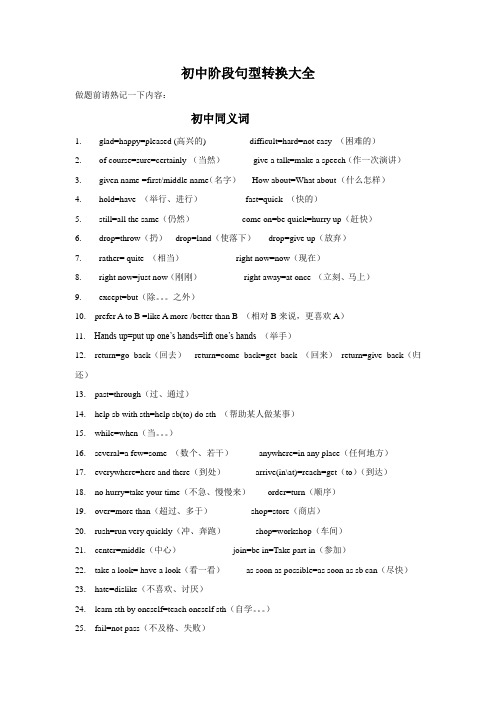
初中阶段句型转换大全做题前请熟记一下内容:初中同义词1. glad=happy=pleased (高兴的) difficult=hard=not easy (困难的)2. of course=sure=certainly (当然) give a talk=make a speech(作一次演讲)3. given name =first/middle name(名字) How about=What about (什么怎样)4. hold=have (举行、进行)fast=quick (快的)5. still=all the same(仍然)come on=be quick=hurry up(赶快)6. drop=throw(扔)drop=land(使落下) drop=give up(放弃)7. rather= quite (相当) right now=now(现在)8. right now=just now(刚刚) right away=at once (立刻、马上)9. except=but(除。
之外)10. prefer A to B =like A more /better than B (相对B来说,更喜欢A)11. Hands up=put up one’s hands=lift one’s hands (举手)12. return=go back(回去)return=come back=get back (回来)return=give back(归还)13. past=through(过、通过)14. help sb with sth=help sb(to) do sth (帮助某人做某事)15. while=when(当。
)16. several=a few=some (数个、若干) anywhere=in any place(任何地方)17. everywhere=here and there(到处) arrive(in\at)=reach=get(to)(到达)18. no hurry=take your time(不急、慢慢来) order=turn(顺序)19. over=more than(超过、多于)shop=store(商店)20. rush=run very quickly(冲、奔跑) shop=workshop(车间)21. center=middle(中心) join=be in=Take part in(参加)22. take a look= have a look(看一看) as soon as possible=as soon as sb can(尽快)23. hate=dislike(不喜欢、讨厌)24. learn sth by oneself=teach oneself sth(自学。
中考英语丨初中英语句型转换大全
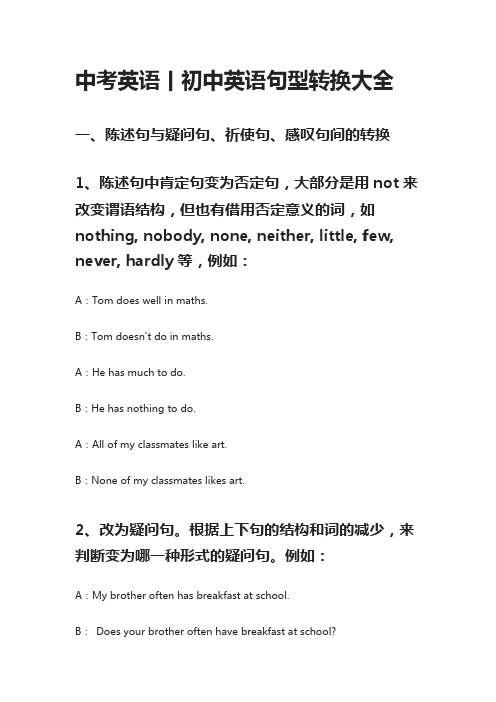
中考英语丨初中英语句型转换大全一、陈述句与疑问句、祈使句、感叹句间的转换1、陈述句中肯定句变为否定句,大部分是用not来改变谓语结构,但也有借用否定意义的词,如nothing, nobody, none, neither, little, few, never, hardly等,例如:A:Tom does well in maths.B:Tom doesn't do in maths.A:He has much to do.B:He has nothing to do.A:All of my classmates like art.B:None of my classmates likes art.2、改为疑问句。
根据上下句的结构和词的减少,来判断变为哪一种形式的疑问句。
例如:A:My brother often has breakfast at school.B:Does your brother often have breakfast at school?A:Tom's already weak in English.B:Tom's already weak in English, isn't he ?A:The red light changes every two minutes.B:How often does the red light change?3、改为感叹句。
根据所给的句子结构和单词的词性,来确定使用哪一种感叹句的形式,例如:A:This is an interesting book.B:What an interesting book this is!或How interesting this book is!二、同义句转换。
根据上句,写出一个意思相同(或相近)的下句,此类形式繁多,内容复杂,涉及面广,归类如下:1、同义词或词组之间的转换。
初中英语句型转换共43页

35、不要以为自己成功一次就可以了 ,也不 要以为 过去的 光荣可 以被永 远肯定 。
41、学问是异常珍贵的东西,从任何源泉吸 收都不可耻。——阿卜·日·法拉兹
42、只有在人群中间,才能认识自 己。——德国
43、重复别人所说的话,只需要教育; 而要挑战别人所说的话,则需要头脑。—— 玛丽·佩蒂博恩·普尔
44、卓越的人一大优点是:在不利与艰 难的遭遇里百折不饶。——贝多芬
45、自己的饭量自己知道。——苏联
初中英语句型转换
31、别人笑我太疯癫,我笑他人看不 穿。(名 言网) 32、我不想听失意者的哭泣,抱怨者 的牢骚 ,这是 羊群中 的瘟疫 ,我不 能被它 传染。 我要尽 量避免 绝望, 辛勤耕 耘,忍 受苦楚 。我一 试再试 ,争取 每天的 成功, 避免以 失败收 常在别 人停滞 不前时 ,我继 续拼搏 。
- 1、下载文档前请自行甄别文档内容的完整性,平台不提供额外的编辑、内容补充、找答案等附加服务。
- 2、"仅部分预览"的文档,不可在线预览部分如存在完整性等问题,可反馈申请退款(可完整预览的文档不适用该条件!)。
- 3、如文档侵犯您的权益,请联系客服反馈,我们会尽快为您处理(人工客服工作时间:9:00-18:30)。
句型转换1. My mother is watching TV now. (用sometimes改写)My mother sometimes __________ ________ at home.2. Tom often plays football on Sundays. (划线提问)___________ _________ Tom often _________ on Sundays.3. He sleeps nine hours every night.(划线提问)_________ __________ ________ he sleep every night?4. He didn’t go to school yesterday. I think. (合并为一句)I _________ ________ he ________ _________ school yesterday.5. It’s important that we should eat a balanced diet. (同意句)It’s important _________ _________ _________ __________ a balanced diet.6. What’s the trouble with Tony? (同意句)________ ________ ________ with Tony?7. The boy has to play the piano every day.(一般疑问句)________ the boy _______ ________ play the piano every day?8. We hope that we can visit this place again.(同意句)We hope ________ ________ this place again.9. He decided to buy a new house.(同意句)He decided ________ __________ a new house.10. The Smiths are going to New York on May 10th.(划线提问)_________ __________ ___________ ___________ the Smiths going?11. The early bus takes him to school.(同意句)He __________ __________ __________ _________ to school.12. It took him about an hour to do his homework every day.(同意句)He _________ about an hour _________ __________ his homework every day.13. Lily lives about 10 kilometers from the airport.(划线提问)_________ _________ _________ Lily __________ from the airport.14. It was Friday, the 12th yesterday. (划线提问)_________ __________ yesterday?15. Why don’t you come and play soccer with us?(同意句)_______ __________ come and play soccer with us?16. They are busy studying for the test.(划线提问)_________ __________ they busy __________ ?17. I’m 13. he is 15.(合并句一句)I’m ________ _________ ________ _________ him.18. Both of us are good at schoolwork.(同意句)_______ are ________ good at schoolwork.19. I have two apples,he has two apples ,too.(合并为一句)I have _______ ________ ________ ________ he.20. I think English is more difficult than the other subjects.(同意句)I don’t think the other subjects are ______ __________ ________ English.21. We need to have much water.(线提问)_________ ___________ you ________ __________ ________ ?22. My mother put in two teaspoons of butter.(划线提问)_________ __________ butter _________ your mother _______ in?23. There were some sharks .(一般疑问句并做否定回答)_______ ________ ________ sharks? No, there _________>24. My sister stayed there for two years.(划线提问)_________ _________ ___________ your sister _________ there?25. He began to learn the accordion when he was five years old.(同意句)________ _______ ________ _______ _______ , he began to learn the accordion.26. She wants to be a computer programmer .(同意句)She ______ __________ ________ _________ a computer programmer.27. The student have a school trip in spring.(用next week 代替spring)The students ________ ________ ________ _________ a school trip next week. 28. He is going to be an engineer when he grows up.(划线提问)_________ is he going to ________ when he grows up?29. I have to stay at home because of the cold weather.(同意句)I have to stay at home _________ ________ _________.30. You took care of my dog when I was not at home . Thank you.(合并为一句)精品文档Thanks __________ ______ ________ _______ my dog when I was not at home.31. He is very young. He can’t carry the heavy box.(合并为一句)He is _______ _________ _________ carry the heavy box.32. The car is too expensive for me to buy it.(同意句)The car isn’t________ _____ for me to buy it.33. Jim likes apples better than any other fruit.(同意句)Jim likes apples _______ _________ _________ the fruits.34. He went to Beijing by train.(同意句)He _______ _______ _________ to Beijing.35. Tina bought a gift yesterday.(变为否定句)Tina ________ _________ a gift yesterday.36. Bob won the first prize in the competition three years ago.(划线提问)________ ________ Bob ________ the first prize in the competition?37. The kids are going to the zoo by bike. (划线提问)_______ _________ the kids ________ to the zoo?37. I can buy some drinks and snacks.(改为语气委婉的提问)_______ _________ _________ ___________ __________ ______ _______ ?38. Nobody is more active than Meimei.(同意句)Meimei is __________ __________ __________ of all.39. How much is your T-shirt?(同意句)________ the _________ of your T-shirt?40. Helen has the same idea as Gina.(同意句)Helen _________ __________ Gina.初二英语句型转换练习1.There’s no time to have lunch. ( 改反意疑问句)There’s no time to have lunch, ______ _______?2.What does he often do on Monday?(用last Monday改写)What _____ he _____ last Monday?3.Her brother likes apples very much.( 改否定句)Her brother _______ like apples ______ _______. 4.Jim couldn’t find the book on the desk. (改反意疑问句) Jim couldn’t find the book on the desk, ______ ______?5.I don’t think he can move the table. (改反意疑问句)I don’t think he can move the table, ______ ______?6.Both of the boys are good at swimming. (改否定句)_______ of the boys _____ good at swimming.7.It’s wet and hot today. (就划线部分提问)What’s _____ _______ ______ today?8.They lived there for twenty years. (就划线部分提问)______ ______ ______ they live there?9.The teacher is talking with her father. (就划线部分提问) _____ _____ the teacher ________ _______?10.He has to do the washing on Saturday. (就划线部分提问) _____ _____ he ______ to _____ on Saturday?11.You teacher seemed angry. (改反意疑问句)Your teacher seemed angry, ______ ______?12.We went to Wuhan every two years. (就划线部分提问) _______ ______ ______ you ______ to Wuhan?13.My aunt went back ten months ago. (就划线部分提问) ______ ______ your aunt go back?14.My brother has to drive the car. (改一般疑问句)______ _______ brother ______ to drive the car?15.We’ll have to eat mooncakes in the room. (改否定句) We ______ _______ to eat mooncakes in the room.16.He must do it today. (改反意疑问句)He must do it today, ______ _______?17.There is something wrong with the radio. (改否定句) There _____ _________ wrong with the radio.18.Someone is in the room. (改反意疑问句)Someone is in the room, _____ _______?精品文档19.The man said nothing for a moment. (就划线部分提问)______ ______ the man _____ for a moment?20.We can’t find the sign somewhere. (改一般疑问句)______ ______ find the sign __________?21.Both of the stories are interesting. (改否定句)_______ ______ the stories _____ interesting.22.You’d better go out at night. (改否定句)You’d ______ ______ go out at night.23.It’s a terrible cough. (改感叹句)______ ____ _________ cough!24.Either Jim or Kate will go to Hainan for the winter holidays. (否定句) _________ Jim ______ Kate will go to Hainan for the winter holidays.25.Mike watched TV last night. (就画线部分提问)_____ _____ Mike ______ last night?26.You mustn't play on the road. (改为祈使句)______ ______ on the road.27.Must I finish my homework today? (给出否定回答)______, you ______.28.He is a very clever boy. (改为感叹句)______ a ______ boy he ______!= _____ _______ the boy _____!29.Mrs. Green does some shopping every day.(完成反意疑问句)Mrs. Green does some shopping every day ,______ _______?30.His father took him to the park yesterday. (就画线部分提问)______ ______ his father ______ him to the park?31.There is some water in the bottle. (改为否定句)There ______ ______ water in the bottle32.She went to London by air yesterday. (就画线部分提问)______ ______ she ______ to London yesterday?33.You can't leave your son by himself, can you? (给出否定回答)______, I ______.34.The weather is very bad. (改为感叹句)______ ______ weather!35.We ran to the tree. We couldn't see any more monkeys.(把两个简单句连成一个并列句)We ran to the tree, ______ we couldn't see any more monkeys. 36.It took me two hours to mend the bike. (就画线部分提问)______ ______ ______ it ______ you to mend the bike?37.I turned on the radio. We sat down and listened to the music. (把两个简单句连成一个并列句)I turned on the radio _____ we sat down and listened to the music.38. Turn off the radio. (改反意疑问句)Turn off the radio, _________ ________?39.The boy is so strong. He can carry the heavy box.(把两个句子合并成一个句子)The boy is _________ ________ to carry the heavy box.40. He told me to bring some food. (变成否定句))He ______ me _______ _______ bring ______ food.41.He is a boy of five. He can speak a little English. (连成并列句) He is a boy of five, _______ he can speak a little English.42. Both you and I are happy. (变成否定句)_____ you ________ I ________ happy.43.Swimming is my favourite. (同义句转换)My ________sport is________.44.Let's cook something English. (变成反意疑问句)Let's cook something English,________ ________?45.I like chicken than any of others. (同义句转换)I like chicken _____ ______ ______.47.He likes cabbages. (用tomatoes改成选择疑问句)精品文档________ he ________ cabbages ________ ________?48.I’ll tell my father about it tomorrow. (用yesterday 改写句子)I ________ my father about it ________.49.This kind of food is delicious. (变成感叹句)________ ________ this kind of food is!50.There is something interesting in today's newspaper. (变一般疑问句)________ ________ _______ interesting in today's newspaper?51.Tom is writing the new words on the blackboard.(就划线部分提问)________ ________ Tom________?52.They are going to leave at nine. (就划线部分提问)________ ________ are they going to leave?53.Mr. Smith usually goes to work by bike.(就划线部分提问)________ ________ Mr. Smith usually ________ to work?54.Tim always has supper at home.(改为一般疑问句)________Tim ________ ________ supper at home?55..my pencil, your pencil, long (用…than…连成一个句子)_______________________________________________精品文档。
